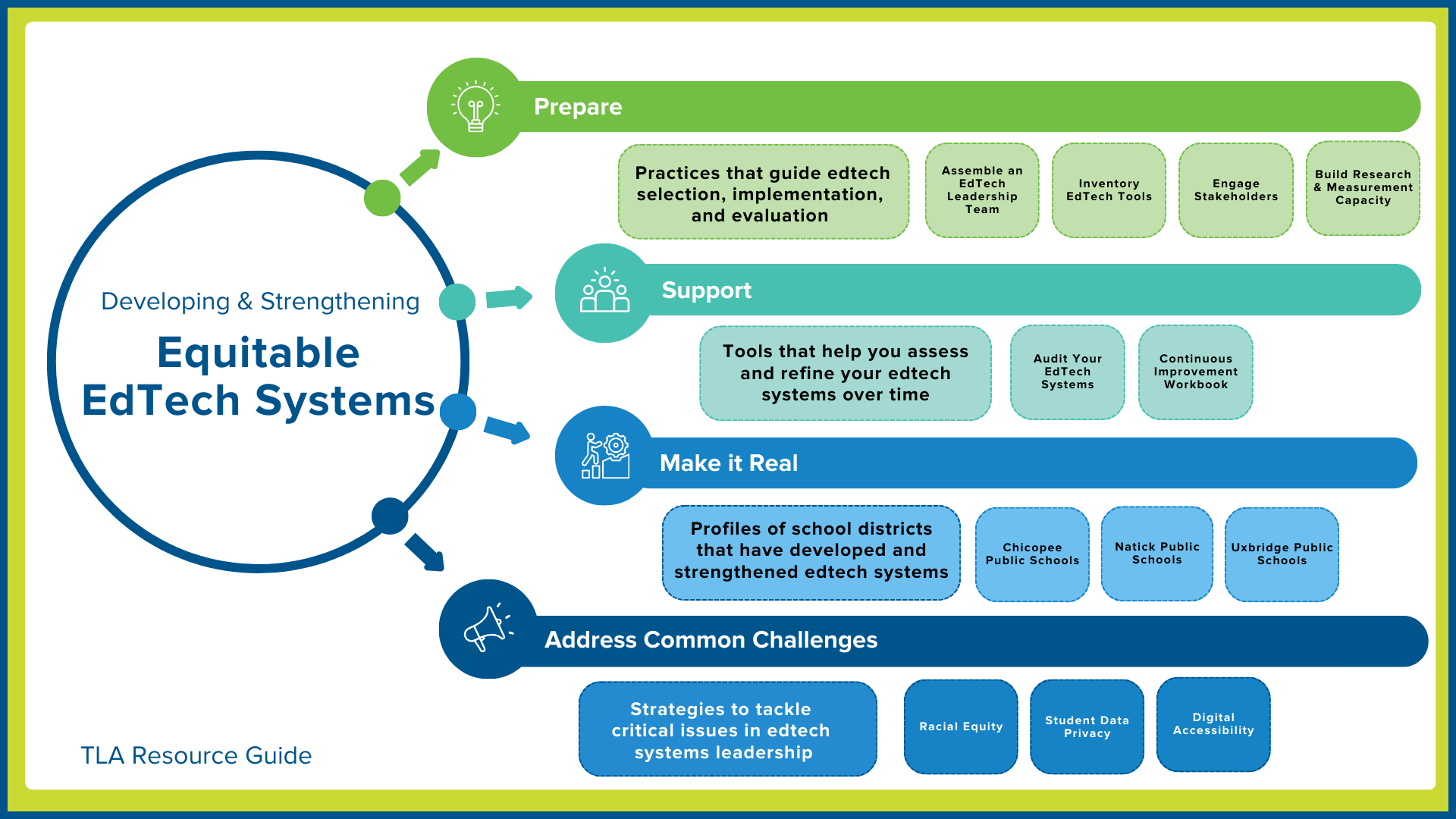
As the school year begins, edtech leaders have a vital opportunity to reflect on their practices, identify areas for improvement, and set goals aligned with broader school and district priorities. Through intentional approaches, these efforts can transform edtech systems into powerful tools that promote equity, center student success, and adapt to evolving technological demands — all while prioritizing the needs of historically marginalized groups.
We’re excited to introduce 12 new resources designed to help edtech leaders seize these opportunities to develop and strengthen equitable edtech systems in their schools and districts. Developed through The Learning Accelerator’s (TLA) partnership with the Massachusetts Department of Elementary and Secondary Education’s Office of Educational Technology, these tools are crafted to support leaders in four key areas:
-
Laying the groundwork for effective edtech leadership
-
Guiding continuous improvement of edtech systems
-
Providing real-world examples of edtech systems in action
-
Addressing key challenges in equitable edtech leadership
These resources offer targeted support for enhancing edtech systems and practices, illustrated in the diagram below.

Prepare: Building a Foundation
Equitable edtech systems are built on a strong foundation of practices that guide selection, implementation, and evaluation. Here are four tools to help leaders build the core skills necessary for effective edtech leadership:
-
Assembling an EdTech Leadership Team guides leaders in creating a diverse team that brings together perspectives from across the school, district, or system, ensuring that edtech initiatives are well-supported and aligned with community needs.
-
Inventorying EdTech Tools helps leaders maintain an accurate inventory, understanding what tools are being used, how they’re utilized, and where gaps or redundancies may occur.
-
Engaging Stakeholders offers strategies to involve educators, students, families, and community members in the decision-making process, ensuring that all voices are heard, especially those historically underserved.
-
Conducting Research & Measurement provides guidance on developing research questions, collecting and analyzing data, and using that information to drive continuous improvement, ensuring decisions are evidence-based and aligned with equity and student success goals.
Support: Systems for Development & Improvement
With foundational skills in place, leaders can focus on improving their edtech systems. This section introduces two tools for assessing current practices and planning for growth:
-
EdTech Systems Audit guides leaders in conducting a comprehensive audit of their edtech systems, helping them identify strengths, weaknesses, and opportunities for growth.
-
EdTech Systems Improvement Workbook provides a step-by-step guide for designing and implementing measurable improvement efforts, offering structure and support to refine practices or introduce new initiatives.
Make it Real: Improvement in Action
Seeing how these practices work in real-world settings is invaluable. Here, we highlight three team profiles from the EdTech Peer Learning Cohort that showcase successful edtech systems improvement:
-
Chicopee Public Schools illustrates how distributed leadership and strategic planning helped build cohesive and effective edtech systems.
-
Natick Public Schools demonstrates the integration of accessibility and equity into edtech systems, focusing on the needs of historically marginalized students.
-
Uxbridge Public Schools showcases the strategic incorporation of digital learning skills into instructional practices, aligning edtech initiatives with broader educational goals.
Address Common Challenges: Key Themes
Finally, we developed three tools that address critical themes in equitable edtech leadership: racial equity, student data privacy, and digital accessibility. These tools guide the incorporation of these considerations into all aspects of edtech decision-making:
-
Racial Equity offers strategies for selecting, implementing, and evaluating edtech tools to disrupt systemic disparities and promote equity.
-
Student Data Privacy provides a framework for protecting student data in all edtech decisions, ensuring privacy from tool selection to daily use.
-
Digital Accessibility ensures that all students, including those with disabilities, can access and benefit from edtech tools, offering guidance on evaluating and implementing tools that meet accessibility standards.
Putting Resources into Practice
We encourage you to explore these tools, integrate them into your work, and use them to guide your edtech decisions throughout the year. If you have questions, want to learn more, or have success stories to share, we’d love to hear from you at info@learningaccelerator.org.

